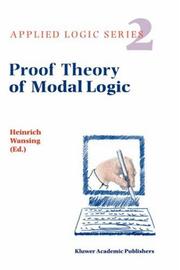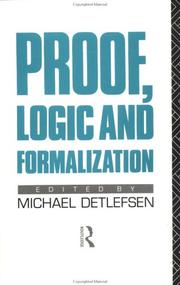| Listing 1 - 10 of 14 | << page >> |
Sort by
|
Book
ISBN: 9782806132567 Year: 2024 Publisher: Louvain-la-Neuve : Academia,
Abstract | Keywords | Export | Availability | Bookmark
 Loading...
Loading...Choose an application
- Reference Manager
- EndNote
- RefWorks (Direct export to RefWorks)
Manuel de logique moderne classique pour étudiants et chercheurs du supérieur, cet ouvrage présente la méthode du calcul des séquents (les groupes L). Celle-ci est une méthode de décision syntaxique ou une théorie de la démonstration utilisée par Joseph Dopp pour construire six systèmes logiques. Chacun de ces systèmes utilise des schémas d'introduction d'un opérateur dans l'antécédent ou dans le conséquent pour l'engendrement ou la démonstration des théorèmes en conformité avec les règles et les opérateurs logiques : l'implication, la conjonction, la disjonction, la négation, la négation stricte et le schéma f. Cet ouvrage présente ces systèmes logiques, les analyse, les explicite et les enrichit des exercices d'illustration résolus pour faciliter au lecteur l'approfondissement et la maîtrise de la méthode des séquents.
Book
ISBN: 2881470602 9782881470608 Year: 1989 Publisher: Cousset : Éd. DelVal,
Abstract | Keywords | Export | Availability | Bookmark
 Loading...
Loading...Choose an application
- Reference Manager
- EndNote
- RefWorks (Direct export to RefWorks)
Book
ISBN: 8879994131 Year: 2004 Publisher: Roma : Aracne,
Abstract | Keywords | Export | Availability | Bookmark
 Loading...
Loading...Choose an application
- Reference Manager
- EndNote
- RefWorks (Direct export to RefWorks)

ISBN: 0792341201 9780792341208 9048147204 9401727988 Year: 1996 Volume: v. 2 Publisher: Boston : Kluwer,
Abstract | Keywords | Export | Availability | Bookmark
 Loading...
Loading...Choose an application
- Reference Manager
- EndNote
- RefWorks (Direct export to RefWorks)
Modality (Logic) --- Proof theory --- Modalité (Logique) --- Théorie de la preuve --- Congresses. --- Congrès --- Modalité (Logique) --- Théorie de la preuve --- Congrès --- Modality (Logic) - Congresses. --- Proof theory - Congresses. --- Modalité (logique) --- Théorie de la démonstration
Book
ISBN: 9781108439534 9781108424189 1108439535 110842418X Year: 2019 Publisher: Cambridge : Cambridge University Press,
Abstract | Keywords | Export | Availability | Bookmark
 Loading...
Loading...Choose an application
- Reference Manager
- EndNote
- RefWorks (Direct export to RefWorks)
"Proofs play a central role in advanced mathematics and theoretical computer science, yet many students struggle the first time they take a course in which proofs play a significant role. This bestselling text's third edition helps students transition from solving problems to proving theorems by teaching them the techniques needed to read and write proofs. Featuring over 150 new exercises and a new chapter on number theory, this new edition introduces students to the world of advanced mathematics through the mastery of proofs. The book begins with the basic concepts of logic and set theory to familiarize students with the language of mathematics and how it is interpreted. These concepts are used as the basis for an analysis of techniques that can be used to build up complex proofs step by step, using detailed 'scratch work' sections to expose the machinery of proofs about numbers, sets, relations, and functions. Assuming no background beyond standard high school mathematics, this book will be useful to anyone interested in logic and proofs: computer scientists, philosophers, linguists, and, of course, mathematicians. Perfect for self-study, an introduction to proofs course, or as a supplementary text for a discrete mathematics course or foundations of computing course. Systematic and thorough, showing how several techniques can be combined to construct a complex proof. Covers logic, set theory, relations, functions, and cardinality" [Publisher]
Book
ISBN: 9780192895936 9780192895943 0191938793 0192895931 019289594X 0192649299 9780192649294 Year: 2021 Publisher: Oxford, UK : Oxford University Press,
Abstract | Keywords | Export | Availability | Bookmark
 Loading...
Loading...Choose an application
- Reference Manager
- EndNote
- RefWorks (Direct export to RefWorks)
"Proof theory is a central area of mathematical logic of special interest to philosophy . It has its roots in the foundational debate of the 1920s, in particular, in Hilbert's program in the philosophy of mathematics, which called for a formalization of mathematics, as well as for a proof, using philosophically unproblematic, "finitary" means, that these systems are free from contradiction. Structural proof theory investigates the structure and properties of proofs in different formal deductive systems, including axiomatic derivations, natural deduction, and the sequent calculus. Central results in structural proof theory are the normalization theorem for natural deduction, proved here for both intuitionistic and classical logic, and the cut-elimination theorem for the sequent calculus. In formal systems of number theory formulated in the sequent calculus, the induction rule plays a central role. It can be eliminated from proofs of sequents of a certain elementary form: every proof of an atomic sequent can be transformed into a "simple" proof. This is Hilbert's central idea for giving finitary consistency proofs. The proof requires a measure of proof complexity called an ordinal notation. The branch of proof theory dealing with mathematical systems such as arithmetic thus has come to be called ordinal proof theory. The theory of ordinal notations is developed here in purely combinatorial terms, and the consistency proof for arithmetic presented in detail" [Publisher]
Dissertation
Year: 1998 Publisher: [S.l.]: [chez l'auteur],
Abstract | Keywords | Export | Availability | Bookmark
 Loading...
Loading...Choose an application
- Reference Manager
- EndNote
- RefWorks (Direct export to RefWorks)
Book
ISBN: 287209363X 9782872093632 Year: 1995 Volume: 8 Publisher: Louvain-la-Neuve : Academia,
Abstract | Keywords | Export | Availability | Bookmark
 Loading...
Loading...Choose an application
- Reference Manager
- EndNote
- RefWorks (Direct export to RefWorks)
Logica --- Logique --- Curry-Howard isomorphism --- Proof theory --- Lambda calculus --- Type Theory --- Type theory --- Isomorphisme de Curry-Howard --- Théorie de la démonstration --- Lambda-calcul --- Théorie des types --- Isomorphisme de Curry-Howard. --- Théorie de la démonstration. --- Lambda-calcul. --- Théorie des types. --- Théorie de la démonstration. --- Théorie des types.

ISBN: 1134975287 1280109866 9786610109869 0203980255 9780203980255 9780415023351 0415023351 0415023351 9781134975280 9781280109867 6610109869 9781134975235 9781134975273 9781138009073 1134975279 Year: 1992 Publisher: London ; New York : Routledge,
Abstract | Keywords | Export | Availability | Bookmark
 Loading...
Loading...Choose an application
- Reference Manager
- EndNote
- RefWorks (Direct export to RefWorks)
A collection of essays from distinguished contributors looking at why it is that mathematical proof is given precedence over other forms of mathematical justification.
Proof theory. --- Logic, Symbolic and mathematical. --- Algebra of logic --- Logic, Universal --- Mathematical logic --- Symbolic and mathematical logic --- Symbolic logic --- Mathematics --- Algebra, Abstract --- Metamathematics --- Set theory --- Syllogism --- Logic, Symbolic and mathematical --- Logic symbolic and mathematical --- Logique mathématique. --- Proof theory --- Théorie de la démonstration. --- Logique mathématique. --- Théorie de la démonstration.
Book
ISBN: 0720406919 9786612309076 1282309072 0080954960 9780720406917 Year: 1977 Volume: 87 Publisher: Amsterdam : New York : North-Holland Pub. Co. ; sole distributors for U.S.A., Elsevier North-Holland,
Abstract | Keywords | Export | Availability | Bookmark
 Loading...
Loading...Choose an application
- Reference Manager
- EndNote
- RefWorks (Direct export to RefWorks)
Provability, Computability and Reflection
Logic, Symbolic and mathematical --- 510.6 --- #WWIS:ALTO --- 510.6 Mathematical logic --- Mathematical logic --- Logique mathématique --- Proof theory --- Théorie de la démonstration --- Computational complexity --- Complexité de calcul (informatique) --- Logique mathématique. --- Théorie de la démonstration. --- Mathematics --- Logic, Symbolic and mathematical. --- Proof theory. --- Théorie de la démonstration --- Computational complexity. --- Logique mathématique --- Théorie des modèles --- Théorie des ensembles --- Récursivité, Théorie de la --- Math --- Science
| Listing 1 - 10 of 14 | << page >> |
Sort by
|

 Search
Search Feedback
Feedback About UniCat
About UniCat  Help
Help News
News